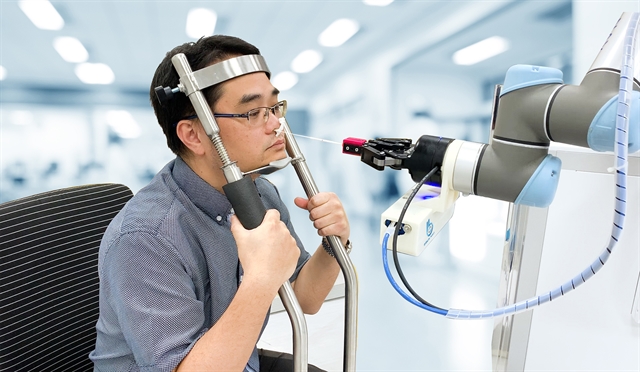Denmark-based collaborative robots (cobots) manufacturer, Universal Robots, has advised business leaders in Viet Nam to leverage robotic automation in response to COVID-19 pandemic challenges.

Denmark-based collaborative robots (cobots) manufacturer, Universal Robots, has advised business leaders in Viet Nam to leverage robotic automation in response to COVID-19 pandemic challenges.
“The COVID-19 outbreak has caused a major shake-up across the global economy. Companies around the world and in Viet Nam need to pivot and adapt to this new reality fast. The use of robots is highly encouraged in light of new standard operating procedures, including physical-distancing and minimal human contact.
Health care, medical testing, disinfection and sterilisation being top priorities in Viet Nam to battle COVID-19, it is pivotal to look for solutions that can respond to new demands rapidly. As such, collaborative robots or cobots are well placed to cope with these challenges,” said Darrell Adams, Head of Southeast Asia & Oceania for Universal Robots.
Adams said Viet Nam has been taking drastic and people-centric measures in fighting COVID-19 and proven itself a good role model worldwide.
As the pandemic has returned, Viet Nam should continue its collective efforts to track and trace potential COVID-19 cases, while also adopting new methods and technologies to strengthen its testing and treatment capacity of the health care system, as well as secure disinfection both in medical facilities and infected areas.
Contributing to the global response to the pandemic, Universal Robots’ cobot deployments include applications in critical front-line industries such as health care, medical testing, sanitisation, disinfection, medical equipment, as well as tools to re-shore production and enable operations to be more flexible.
Minimising human contact and protecting workers health care staff and patients from cross infections, cobot applications in the health and related industry have been rapidly developed this year.
A niche product that accounted for just 3 per cent of global robot spending in 2018, cobots are now the fastest-growing segment of the industrial robot sector. By 2025, cobots are expected to account for 34 per cent of global robot spending. — VNS





